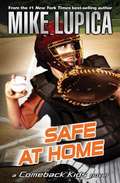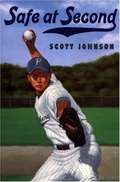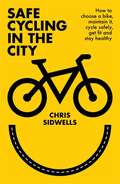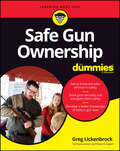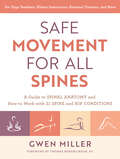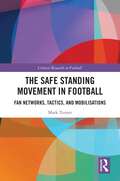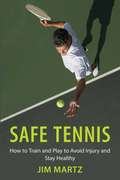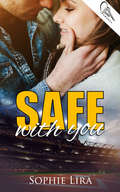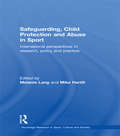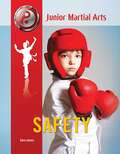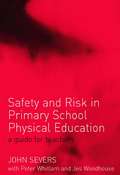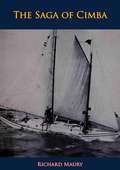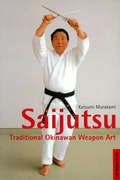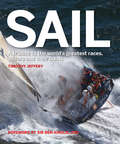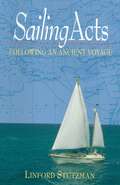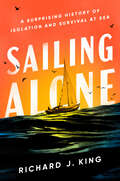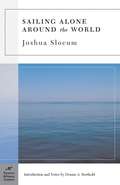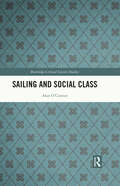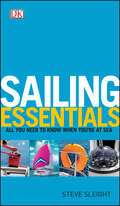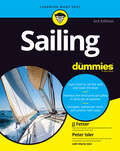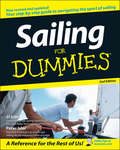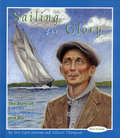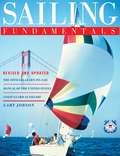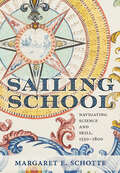- Table View
- List View
Safe at Home (A Comeback Kids Novel)
by Mike LupicaNick Crandall feels like he doesn't belong anywhere. He doesn't fit in with his new foster parents. They don't know the first thing about sports - and he's not exactly the model student they want him to be. It's only a matter of time until they realize he's not the right kid for them. And Nick certainly doesn't belong playing varsity baseball. He's only twelve years old! His teammates want a catcher their own age. But Nick needs to prove that he belongs - to his parents, to his team, and to himself.
Safe At Second
by Scott JohnsonTodd Bannister's future is as bright as a new baseball. With a fastball destined for the major leagues, a shelf overflowing with trophies, college and pro scouts lined up at his door -- not to mention Melissa, his beautiful girlfriend, and Paulie, his best friend and number one fan -- Todd has it all. Then comes the line drive off a bat that strikes Todd square in the face. Now things are different. Life looks a lot darker when viewed through a glass eye. Can Todd find the determination to pitch again? Or perhaps more important -- can he find the courage to move on with his life, despite a world that seems desperate for him to remain in the past? Told from Paulie's point of view, this multi-layered story about the pursuit of a dream will leave readers cheering just when they least expect it.
Safe Cycling in the City: How to choose a bike, maintain it, cycle safely, get fit and stay healthy
by Chris SidwellsThis is an urban and commuting cyclist's handbook, both inspirational and practical, showing us how to live safer, more enjoyable and healthier lives, both physically and mentally, while reducing our impact on the planet.Author of numerous bestselling bike books, Chris Sidwells, begins with a brief introduction which shows how cycling is already forming a crucial part of future urban transport, good for the environment as well as our health. Current urban transport models, heavily dependent as they are on cars, are unsustainable both in terms of our health and the environment. Cycling offers the perfect mass transport, health and wellbeing solution. As well as being an easy way to improve the fitness of the whole family, with some simple know-how, which Chris shares in this book, it can be perfectly safe even in busy cities. Increasingly, local authorities are seeing the essential role that cycling has to play in transport infrastructure; Chris looks at the many different schemes, both financial and infrastructural, to encourage people onto bikes. Commuting by bike also offers a financial benefit to individuals and societies.Chris shows how to get the right bike for you for commuting and urban cycling, whether that's an electric-assisted bike or pedal-powered only, and how to adjust it properly for your unique build. He looks at cycling clothing and accessories, including helmets, masks, locks and safety equipment. Chris explains how to keep cycling safely despite inclement weather and the different ways to transport what you need to and from work. A chapter on bike care and maintenance shows how to carry out basic repair jobs like adjusting gears, mending punctures and adjusting brakes.Chris explains cycling skills to give you confidence when cycling, including bike control, braking and how to make the most of your gears. He shows when and how to use the extra power provided by an electric bike and offers encouragement to new and returning cyclists.An extended chapter covers road safety, perhaps the biggest barrier to people commuting by bike. Chris shows how to co-exist safely with other road users and the potential hazards that every cyclist should be aware of. He explains the rules that every cyclist must follow and gives step-by-step guidance on how to carry out manoeuvres on the road.Chris shows how to choose the best route to and from work. He gives details of the various schemes to encourage commuting by bike, including insurance and where to find information.Cycling is regarded by many as the best way to regain and maintain fitness. As well as improving both physical and mental wellbeing, cycling can boost our immune system. Cycling also gives self-sufficiency and enhances self esteem.
Safe Cycling in the City: How to choose a bike, maintain it, cycle safely, get fit and stay healthy
by Chris SidwellsThis is an urban and commuting cyclist's handbook, both inspirational and practical, showing us how to live safer, more enjoyable and healthier lives, both physically and mentally, while reducing our impact on the planet.Author of numerous bestselling bike books, Chris Sidwells, begins with a brief introduction which shows how cycling is already forming a crucial part of future urban transport, good for the environment as well as our health. Current urban transport models, heavily dependent as they are on cars, are unsustainable both in terms of our health and the environment. Cycling offers the perfect mass transport, health and wellbeing solution. As well as being an easy way to improve the fitness of the whole family, with some simple know-how, which Chris shares in this book, it can be perfectly safe even in busy cities. Increasingly, local authorities are seeing the essential role that cycling has to play in transport infrastructure; Chris looks at the many different schemes, both financial and infrastructural, to encourage people onto bikes. Commuting by bike also offers a financial benefit to individuals and societies.Chris shows how to get the right bike for you for commuting and urban cycling, whether that's an electric-assisted bike or pedal-powered only, and how to adjust it properly for your unique build. He looks at cycling clothing and accessories, including helmets, masks, locks and safety equipment. Chris explains how to keep cycling safely despite inclement weather and the different ways to transport what you need to and from work. A chapter on bike care and maintenance shows how to carry out basic repair jobs like adjusting gears, mending punctures and adjusting brakes.Chris explains cycling skills to give you confidence when cycling, including bike control, braking and how to make the most of your gears. He shows when and how to use the extra power provided by an electric bike and offers encouragement to new and returning cyclists.An extended chapter covers road safety, perhaps the biggest barrier to people commuting by bike. Chris shows how to co-exist safely with other road users and the potential hazards that every cyclist should be aware of. He explains the rules that every cyclist must follow and gives step-by-step guidance on how to carry out manoeuvres on the road.Chris shows how to choose the best route to and from work. He gives details of the various schemes to encourage commuting by bike, including insurance and where to find information.Cycling is regarded by many as the best way to regain and maintain fitness. As well as improving both physical and mental wellbeing, cycling can boost our immune system. Cycling also gives self-sufficiency and enhances self esteem.
Safe Gun Ownership For Dummies
by Greg LickenbrockA straightforward guide to being smart with your firearm With gun sales at an all-time high in the U.S., easy-to-understand advice on storing and possessing guns safely is at an all-time premium. Safe Gun Ownership For Dummies paves the way for new and novice gun owners to learn the basics of firearm ownership in a non-partisan tone. This book helps gun owners thoroughly explore the rules of gun safety and adopt the habits of savvy firearm aficionados. Written by a firearms expert and analyst who has reviewed hundreds of firearms along with gun safety and storage options, this guide helps you develop a safety mindset and apply practices to assure you and your family avoid harm. Learn, internalize, and apply the rules of gun safety Understand federal, state, and local gun laws Find a good gun safety course for hands-on practice Store and transport your firearm securelyWhen it’s time to start training on your new firearm and the safety rules of gun ownership, Safe Gun Ownership For Dummies is at the ready with everything you need to know to make safety your aim.
Safe Movement for All Spines: A Guide to Spinal Anatomy and How to Work with 21 Spine and Hip Conditions
by Gwen MillerA comprehensive resource for yoga teachers, pilates instructors, and movement therapists--exercises, ergonomic adjustments, and daily-living activities for back pain, scoliosis, disc disease, and 18 other spinal conditionsSafe Movement for All Spines is an essential guide for all movement therapists and teachers. With ready-made exercises and easy adaptations, yoga instructors, pilates teachers, and fitness instructors will learn: How to distinguish among different common spinal pathologies and mechanical dysfunctions--plus appropriate interventions and adjustments for eachAll about osteoporosis, spinal stenosis, hypermobility syndromes, and moreGuidelines for appropriate movement and injury preventionHow to work safely and effectively with both pre- and post-surgical clientsTargeted programs for specific back-pain issuesAccessible and easy to understand, the lessons and practices from Safe Movement for All Spines are appropriate to share with clients practicing at home or in the studio. Each condition is clearly explained with detailed illustrations and real-life examples, making for an empowering and educating experience. An invaluable resource, Safe Movement for All Spines is an up-to-date must-have for every yoga or pilates teacher&’s reference library.
The Safe Standing Movement in Football: Fan Networks, Tactics, and Mobilisations (Critical Research in Football)
by Mark TurnerThis book tells the important story of the 30-year social movement against all-seated stadia in football in England and Wales that developed in the wake of the Hillsborough stadium disaster and the wider European and international significance of that movement. Examining the fan networks, relations, tactics and interactions which built the ‘Safe Standing’ movement, it reveals an untold social history of football supporter activism and represents an important contribution to our understanding of football supporter-based social movements, the sociology of football, and to social movement studies more broadly. The book argues that Safe Standing is sociologically highly significant because the restriction and partial exclusion of football fans as a social group in the timescape of English football after Hillsborough marked a moment of profound social change in the UK. Applying relational sociology, and drawing on original research and insider access, the book considers how events and ruptures, like Hillsborough, shape the dynamics of a social movement, and shows how supporters, who have been deeply affected by the all-seating legislation, are now in a position to affect the future consumption of football. The book shows how this was achieved, how a small core network of approximately 30 supporters, networked with supporter groups across Europe, now stand to impact and shape the consumption habits of a key leisure practice all over the world. This is fascinating reading for any student, researcher or policy-maker with an interest in football, sociology, political science, public policy, or cultural and social history.
Safe Tennis: How to Train and Play to Avoid Injury and Stay Healthy
by Jim MartzCorrect preparation is important in all aspects of life, but if you fail to warm up properly before playing tennis it could land you in the hospital for weeks. Just look how often professional tennis players are getting injured--sometimes bringing an early end to a promising career--and consider that these athletes are in peak physical shape. So just imagine the risk you are putting yourself at when you venture out for your weekly tennis match. With images that illustrate the exercises to accompany the text, Safe Tennis teaches you how to avoid these injuries and how to properly prepare yourself with detailed warm-up plans and exercises that specifically strengthen you for the sport of tennis. This includes stretching exercises that are designed by physical therapists who specialize in sports medicine. You will also learn the correct way to cool down after your match because injuries can arise if you let your body cool too quickly. Without the worry of nagging injuries, your time on the court will be that much more enjoyable.
Safe With You
by Sophie LiraO livia's starting over in the Big Easy. But just under the surface, she's terrified her abusive ex-boyfriend will find her. Kyle's dream of playing pro baseball was shattered when surgery left him with rods in his leg, a rebuilt knee, and no idea who he is without the sport he'd built his life around. Broken and alone, Olivia and Kyle could be exactly what the other needs. Just as they begin to trust what they're feeling, things take a dangerous turn when Olivia's past catches up to her. Will Olivia run again, or stay and fight for the life she and Kyle deserve?
Safeguarding, Child Protection and Abuse in Sport: International Perspectives in Research, Policy and Practice (Routledge Research in Sport, Culture and Society)
by Melanie Lang Mike HartillThe safeguarding of children and young people participating in sport has become an increasingly prominent concern in policy-making and research communities around the world. Major organisations such as the IOC and UNICEF now officially recognize that children in sport can be at risk of exploitation and abuse, and this concern has led to the emergence of new initiatives and policies aimed at protecting vulnerable young people and athletes. This book is the first to comprehensively review contemporary developments in child protection and safeguarding in sport on a global level. The book is divided into two parts. Part One critically analyses current child protection and safeguarding policy and practice in sport across a range of countries, including the US, Canada, the UK, Australia, China and Germany, providing a global context for current policy and practice. This represents the most comprehensive review to date of the landscape of child protection and safeguarding in sport and provides a starting point for critical international comparisons. Part Two explores a range of issues related to child protection and safeguarding in sport, including many not covered in previous books, such as emotional abuse, injury and over-training. While in many instances the impetus for policy in this area has arisen from concerns about sexual abuse, the second part of this book therefore opens up a broader, more holistic approach to child and athlete welfare. By bringing together many of the leading researchers working in child and athlete protection in sport from around the world, this book is important reading for all advanced students, researchers, policy-makers or practitioners working in youth sport, physical education, sports coaching, coach education or child protection.
Safety: Using Technology To Improve Safety And Quality (Junior Martial Arts #112)
by Sara JamesMartial arts students don't just learn how to fight. They also learn lots of other important things--like how to stay safe. Martial artists know how to kick, jump, and punch without hurting themselves. They know how to protect their bodies in martial arts class--and out. Discover how martial arts can help you stay safe too!
Safety and Risk in Primary School Physical Education
by John SeversPhysical education and sport in schools is undergoing renewed emphasis and the primary sector key stages are rightly seen as fundamental elements in the new initiatives. The majority of primary school teachers are non-specialists and there is, therefore, a particular need for information on safe planning and practice in physical education to be designed to meet their specific requirements. Safety is a central issue in P.E. and as risk assessment is now a statutory part of Health and Safety at Work requirements, it is vitally important that all staff have a clear understanding of their responsibilities. As all schools are now obliged to undertake risk management, this book addresses a very real need. Safety and Risk in Primary Physical Education gives a comprehensive coverage of all aspects of safety in P.E. in primary schools, including: * legal responsibilities* policies on good practice and risk* pupil readiness* equipment and the environment* each subject area included in the National Curriculum - gymnastics, games, dance, athletics, outdoor and adventurous activities and swimming* checklists of key points for safe practice.
The Saga of Cimba: A Journey From Nova Scotia To The South Seas (The\sailor's Classics Ser.)
by Richard MauryFirst published in 1939, this book is a vivid account of Richard Maury's voyage from New York to Fiji in the small, 35-foot, Nova Scotia-built schooner Cimba. When a 23-year-old Maury and a likeminded sailor filled with wanderlust set off into the winter North Atlantic on November 30, 1933, it proved to be an expedition of high adventure, and one embarked upon at a time when such voyages were practically unheard of. The reader is taken on a fascinating journey to Bermuda and, from there, to Grand Turk, Jamaica, Panama and through the Canal, with the two young sailors finding their every dream come true at Galapagos, Marquesas, Tahiti, Samoa--culminating in a gripping finale at Fiji..."If I were asked to pick the best book in recent years about deep water cruising in a small yacht, I would unhesitatingly choose The Saga of Cimba by Richard Maury."Maury went to sea because he loved being at sea and ports to him were interruptions rather than objectives. The story of his cruise is the story of the struggles and triumphs of his diminutive schooner in breasting thousands of miles of deep water. It is the sailing of the schooner that engrossed him. The yarn is the story of a boat rather than the story of her skipper. One can go on to the book's last enthralling page and be left speculating on what sort of a man this Maury is. He never tells you. You have to sense it from his attitude toward his little vessel. But you are left in no doubt about Cimba herself. You know what manner of ship she is. You know every inch of her by the time you have seen her to the Fijis."--Rudder Magazine"Told with such beauty that it will win the admiration not only of those who sail but of the whole reading public"--New York World Telegram."One of the finest sea yarns of all times"--Rudder."Bound to be the classic of this type"--Boston Transcript."Reality he most exciting small boat yarn I have read"--FELIX REISENBERG.
Saijutsu
by Katsumi MurakamiOffers instruction in the foundation forms for basic weapon handling in step-by-step detail, as well as the specific kata. The book includes stories about the great weapons masters of Murakami's lineage and provides the history of the art and its relationship to Karate.
Sail: A Tribute to the World's Greatest Races, Sailors and Their Boats
by Timothy JefferyA celebration of sailing, featuring profiles on the world’s greatest races & sailors, as well as technical analysis of some of the best racing boats.Whether it is to test the high seas on around-the-world events in the glory of 49er yachts, to cut through choppy coastal waters on a Lazer racing for Olympic Gold or to set team against team in the great cup challenges, Sail is a celebration of the adventure and skill of one of mankind’s oldest sports.Including chapters on the greatest races and their class divisions and the incredible and inspirational stories of the world’s greatest sailors—from Ellen MacArthur to Seve Jarvin, Tony Bullimore to Vinny Lauwers—homage is paid to those who have mastered their boats and set out to conquer the seas.Sail also includes detailed technical analysis and intricate illustrations on each classification of racing boat, explained by the experts in their field, to give a complete account of the world of sailing competition.
Sailing Acts: Following An Ancient Voyage
by Linford StutzmanFor those who love sailing and you-are-there travel literature. Also for those who enjoy studying the life and times of the Apostle Paul. But definitely for those who love adventure, or at least reading about it! Seafaring isn't for the faint of heart. It wasn't for the Apostle Paul in the first century A.D.-shipwrecked, imprisoned, and often a stranger in foreign lands. And it turned out to be a heart-stopping task some two thousand years later, when a religion professor and his wife undertook a 14-month journey by sailboat! They stopped in eight countries, visiting every site where Paul stopped on his tumultuous missionary journeys. "Sailing Acts" traces this 21st-century voyage from Volos, Greece, to Rome, Italy, by car, by foot, by motorized scooter, but mostly on a 33-foot boat, logging more than 3600 nautical miles over two sailing seasons. "Explorers are easy to admire or despise, but very difficult to understand without going on the trip," writes Stutzman. "To really appreciate the experiences, the drama, and development of Paul the explorer, you need to sail with him." So begins Sailing Acts, inviting readers to come on board. Stutzman draws thoughtful comparisons from his own travel mishaps and adventures to the ones Paul experienced on his journeys. This book is in the tradition of Bruce Feiler's Walking the Bible. Stutzman's knowledge of the socio-political setting in the first-century Roman empire provides an informative backdrop to understanding Paul and reading his epistles in a new light. The book includes dozens of photos, maps showing the couple's travel routes, a list of all the repairs and replacements Stutzman made to the aging boat which he bought sight-unseen, and an itinerary of places they visited.Skyhorse Publishing, as well as our Sports Publishing imprint, is proud to publish a broad range of books for readers interested in sports-books about baseball, pro football, college football, pro and college basketball, hockey, or soccer, we have a book about your sport or your team.In addition to books on popular team sports, we also publish books for a wide variety of athletes and sports enthusiasts, including books on running, cycling, horseback riding, swimming, tennis, martial arts, golf, camping, hiking, aviation, boating, and so much more. While not every title we publish becomes a New York Times bestseller or a national bestseller, we are committed to publishing books on subjects that are sometimes overlooked by other publishers and to authors whose work might not otherwise find a home.
Sailing Alone: A Surprising History of Isolation and Survival at Sea
by Richard J. King&“A masterfully curated collection...You don&’t have to be a sailor to be blown away by this fascinating, bighearted book.&” —Nathaniel Philbrick, author of In the Heart of the Sea, Travels with George, and Second WindA story as vast and exhilarating as the open ocean itself, SAILING ALONE chronicles the daring, disastrous, and often absurd history of those who chose to sail across the ocean, in very small boats, alone.Sailing by yourself, out of sight of land, can be invigorating and terrifying, compelling and tedious - and sometimes all of the above in one morning. But it is also a wide expanse of time in which to think. Sailing Alone tells the story of some of the remarkable people who, over the last four centuries, have spent weeks and months, moving slowly over the world's largest laboratory: a capricious and startling place in which to observe oneself, the weather, the stars, and countless sea creatures, from the tiniest to the most massive and threatening. Richard J. King profiles characters famous, diverse, international, and obscure, from Joshua Slocum of 1898 to modern teenagers daring to take the challenge. They see strange hallucinations, lie to us (and themselves) on their travel logs, encounter sharks, befriend birds, and experience ESP, all part of the unnerving reality of extended isolation. And some disappear altogether. Sailing Alone also recounts the author's own nearly catastrophic solo crossing of the Atlantic, and the mystery of his inexplicable survival one sunny afternoon. An enormously engaging new book for skippers and armchair voyagers alike.
Sailing Alone Around the World
by Joshua Slocum Dennis A. BertholdFull of astounding adventures, "Sailing Alone around the World " is the true story of the first man ever to circle the globe alone entirely by sea. In a little over three years, Captain Joshua Slocum completed the feat many experts believed couldn't be done--and he has the stories to prove it. During his historic voyage, Slocum was chased by pirates in Gibraltar, soaked by a "rain of blood" in Australia, and battered by perilous storms in the open ocean. He also met many famous--and infamous--people along the way, from Mrs. Robert Louis Stevenson in Samoa, to Black Pedro, "the worst murderer in Tierra del Fuego." This absorbing tale, written with humor and poetic eloquence, was first published in 1900 and has remained in print ever since.
Sailing and Social Class (Routledge Critical Leisure Studies)
by Alan O'ConnorThis book explores the sociology of sailing and yachting. Drawing on original research, and employing a theoretical framework based on the work of Pierre Bourdieu, the book argues that sailing is, still, an upper-middle-class activity that has much to tell us about the wider sociology of leisure and sport. The book examines the historical foundations of blue-water sailing as established by naval and colonial shipping, to trace the roots of contemporary sailing and yachting culture. It also examines archives of sailing narratives and cruising guides, as well as the children’s books of Arthur Ransome, arguing that this archival material offers a social rather than a psychological interpretation of the ‘bodily investment’ in sailing. The book uses Bourdieu’s concepts of ‘illusio’ – an investment of time, emotion and body into a worthwhile activity – and ‘habitus’, or lifeworld, alongside contemporary data sets, to examine the yacht club as a social institution, including why many boats never go out on the water, the relationship between yacht clubs and the state, and social issues as manifested in yacht clubs, such as sexism, racism and homophobia. Offering a vigorous sociological critique of yachting and sailing, this book is fascinating reading for anybody with an interest in the sociology of leisure and sport, subcultures, social theory, or social issues in wider society.
Sailing Essentials: All You Need to Know When You're at Sea (DK Sports Guides)
by Steve SleightWhether you are a novice or a sailor looking to expand your skills, this indispensable sailing companion will guide you every step of the way.A compact, easy-to-carry reference book, DK&’s Sailing Essentials is packed with all the essential information for practical sailors or just anyone who is interested in the topic. Start with the introductory section on comfort and safety to remind or familiarize yourself with the equipment on board and some basic knowledge, such as when to sail and what to wear. The following sections are full of practical advice on every aspect of sailing, from basic maneuvers to dealing with difficult weather conditions. There is also guidance on maintenance and repairs to ensure you know how to keep your boat in good shape, as well as clear instructions about tying a perfect figure-of-eight and other knots... and much, much more!Sailing Essentials is perfect as a skipper's back-up manual or a quick reference guide for novice sailors. You won't want to set sail without it.
Sailing For Dummies
by J. J. Fetter Peter IslerBuoy your sailing knowhow with advice from two US sailing champions Nothing can beat the feel of the warm sun on your back, the gentle wind in your hair, and a swaying deck under your feet. If you long to take to the open water and sail wherever the wind takes you, you&’ll find everything you need to know in Sailing For Dummies. This friendly guide offers information for beginning and intermediate captains. Discover everything you need to know to confidently navigate your vessel through whatever waters—rough or smooth—you may encounter. Whether your goal is to explore a nearby lake, sail down the Mighty Mississippi, or take to the open sea, Sailing For Dummies explains how to launch your vessel, tie knots, turn sails, read the water, and more. Figure out how to work with the wind using sails to reach your destination Find out how the latest technology makes sailing easier and more enjoyable Master the essential skills of docking, tying knots, and dropping anchor Learn how to read the wind, sea, and sky to know what the weather is up to Choose the boat that&’s right for you, complete with bells and whistles Discover the basics of windsurfing and kiteboarding Satisfy your need to go farther and faster in your craft Know how to sail safely in tricky situations Whether you&’re dipping your toe in the water or knee deep in your pursuit of sailing excellence, this reference will come in handy as you set your sights on sailing. After spending some time with Sailing For Dummies—and even more time on the water—you&’ll know the ropes!
Sailing For Dummies
by J. J. Isler Peter IslerInterested in learning to sail but feel like you’re navigating in murky waters? Sailing for Dummies, Second Edition introduces the basics of sailing, looks at the different types of sailboats and their basic parts, and teaches you everything you need to know before you leave the dock. In Sailing for Dummies, Second Edition, two U.S. sailing champions show you how to: Find and choose a sailing school Use life jackets correctly Tie ten nautical knots Handle sailing emergencies (such as capsizing and rescuing a man overboard) Launch your boat from a trailer, ramp, or beach Get your boat from point A to point B (and back again) Predict and respond to water and wind conditions Read charts, plot your course, use a compass, and find your position at sea Sailing for Dummies shows you that getting out on the water is easier than you think. The authors keep the sailor-speak to a minimum where possible, but give you a grasp of the terminology you need to safely and effectively communicate with your crew. A textbook, user’s manual, and reference all in one, this book takes the intimidation out of sailing and gives you the skills and confidence you need to get your feet wet and become the sailing pro you’ve always wanted to be. Anchors away!
Sailing for Glory: The Story of Captain Angus Walters and the Bluenose
by Teri-Lynn Janveau Allister ThompsonThis book tells the story of the unique bond between Captain Walters and his schooner the Bluenose. The ship is a Canadian icon and an icon of nautical competition, unbeaten between 1921 and 1939 in the races for the International Fishermans Cup. Its success galvanized a young nations national pride, and the ship remains an important symbol in Nova Scotia today. Walters skill and devotion to his ship helped the Bluenose hold off all challengers, even at the end of its illustrious career. Sailing for Glory also brings to life the danger and adventure of the life of a North Atlantic fisherman in the days of sail.
Sailing Fundamentals
by Gary JobsonWritten by America's foremost instructional authority, the new edition of Sailing Fundamentals combines the training programs of the American Sailing Association and the United States Coast Guard Auxiliary. The official learn-to-sail manual of the American Sailing Association, it is also used in the programs of many yacht clubs, colleges, and sailing groups. Unlike most introductory sailing books, which reflect the biases and idiosyncrasies of their authors, Sailing Fundamentals has been extensively pretested by ASA professional instructors to ensure that it offers the fastest, easiest, most systematic way to learn basic sailing and basic coastal cruising. This book covers every aspect of beginning sailing -- from hoisting sail to docking and anchoring -- and specifically prepares the learner to qualify for sailing certification according to international standards. Widely acclaimed author Gary Jobson has won several major races, including the 1977 America's Cup victory as tactician aboard Courageous. He was head sailing coach at the U.S. Naval Academy, and has conducted sailing clinics across the country. Illustrated step-by-step in two colors with over 150 line drawings and photographs.
Sailing School: Navigating Science and Skill, 1550-1800 (Information Cultures)
by Margaret E. SchotteHands-on science in the Age of Exploration.Winner of the John Lyman Book Award in Naval and Maritime Science and Technology by the North American Society for Oceanic History and the Leo Gershoy Prize by the American Historical AssociationThroughout the Age of Exploration, European maritime communities bent on colonial and commercial expansion embraced the complex mechanics of celestial navigation. They developed schools, textbooks, and instruments to teach the new mathematical techniques to sailors. As these experts debated the value of theory and practice, memory and mathematics, they created hybrid models that would have a lasting impact on applied science. In Sailing School, a richly illustrated comparative study of this transformative period, Margaret E. Schotte charts more than two hundred years of navigational history as she investigates how mariners solved the challenges of navigating beyond sight of land. She begins by outlining the influential sixteenth-century Iberian model for training and certifying nautical practitioners. She takes us into a Dutch bookshop stocked with maritime manuals and a French trigonometry lesson devoted to the idea that "navigation is nothing more than a right triangle." The story culminates at the close of the eighteenth century with a young British naval officer who managed to keep his damaged vessel afloat for two long months, thanks largely to lessons he learned as a keen student.This is the first study to trace the importance, for the navigator's art, of the world of print. Schotte interrogates a wide variety of archival records from six countries, including hundreds of published textbooks and never-before-studied manuscripts crafted by practitioners themselves. Ultimately, Sailing School helps us to rethink the relationship among maritime history, the Scientific Revolution, and the rise of print culture during a period of unparalleled innovation and global expansion.
